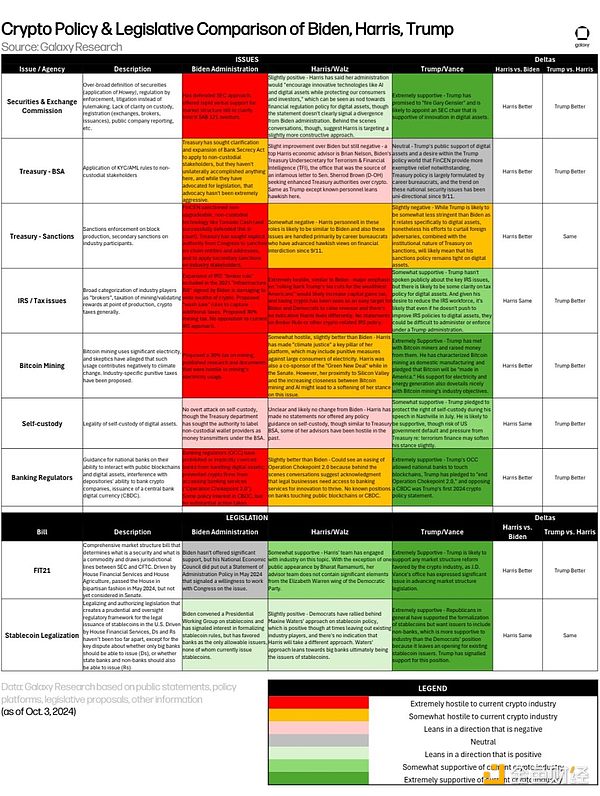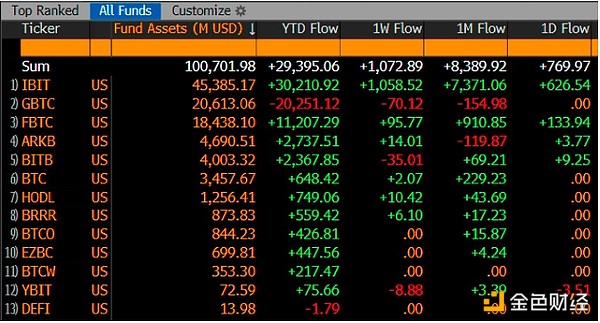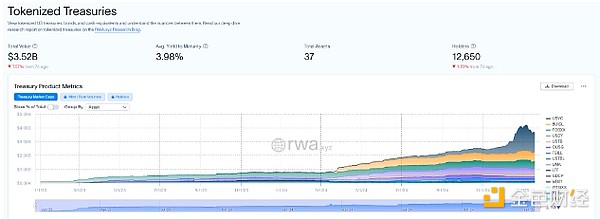Author: Alex O'Donnell, CoinTelegraph; Compiled by Tao Zhu, Jinse Finance
When former U.S. President Joe Biden left office, his crypto currency legacy was quite complex, with both harsh regulatory crackdowns and significant progress in institutional adoption.
On January 20, Donald Trump, a supporter of cryptocurrencies, began his presidential term. While Trump claimed he planned to make the U.S. the "world capital of cryptocurrency," Biden's stance on cryptocurrencies was more contradictory.
Under the leadership of Democratic President Biden, U.S. financial regulators have brought dozens of lawsuits against industry companies, alleging they engaged in illegal activities. On the other hand, they have also paved the way for institutional adoption, approving many regulated crypto products and custodians.
The four-year development of cryptocurrencies has been uneven. Decentralized finance (DeFi) has effectively been banned from the U.S. market, and crypto exchanges have struggled. At the same time, spot crypto ETFs, tokenized U.S. Treasuries, and dollar-backed stablecoins have surged.

The clash between Biden and Trump on crypto policy. Source: Galaxy Research
Regulatory Crackdown
In 2021, Biden appointed Gary Gensler as chairman of the U.S. Securities and Exchange Commission (SEC), the country's top financial regulator. Gensler resigned as SEC chairman on January 20 (the start of Trump's presidency).
Under Gensler's leadership, the SEC and its sister agency, the Commodity Futures Trading Commission (CFTC), have brought over 100 legal actions against crypto companies. Targets include crypto exchange Coinbase, DeFi protocol Uniswap, and infrastructure provider ConsenSys.
Gensler accused these companies of failing to register as securities brokers or exchanges, claiming this "deprived investors of important protections, including SEC inspections, recordkeeping requirements, and safeguards against conflicts of interest."
Industry executives said the agency's actions "have hindered our industry for years, limiting potential technological innovation and services," as Coinbase Chief Legal Officer Paul Grewal wrote in a January 17 post on the X platform.
In 2024, about 30 crypto executives accused the Biden administration of using the Federal Reserve and Federal Deposit Insurance Corporation (FDIC) regulators to restrict crypto companies' access to banking services.
Galaxy Research believes Trump was more supportive of cryptocurrencies than Biden and his Vice President Kamala Harris, who ran against Trump in 2024.

Spot Bitcoin ETF assets surpassed $100 billion in November. Source: Eric Balchunas
Institutional Adoption
Although the Biden administration has taken a harsh enforcement stance, it has also presided over key advancements in institutional crypto adoption and the tokenization of real-world assets (RWAs).
In January and July this year, the SEC approved dozens of spot Bitcoin and Ethereum ETFs for listing in the U.S. market.
Since then, crypto ETFs have dominated the ETF landscape, with the net assets of spot Bitcoin ETFs exceeding $100 billion in November. The world's largest asset manager, BlackRock, now recommends allocating up to 2% of portfolios to Bitcoin.
Will McGough, Chief Investment Officer of Prime Capital Financial, said in July, "The availability of digital assets packaged in ETFs is absolutely a game-changer." Prime Capital Financial is a $24 billion registered investment advisor based in Overland Park, Kansas.
"The ability to access these investments through conventional investment channels may drive broader adoption over time."
Meanwhile, during Biden's tenure, the number of regulated U.S. digital asset custodians has surged, with companies like Coinbase Custody Trust, Fidelity Digital Asset Services, and Anchorage Digital Bank now authorized to custody assets for U.S. clients.
Dozens of other crypto products have also entered the fray, from options contracts on spot Bitcoin ETFs to swaps and futures linked to meme coins like Dogecoin and Bonk.

Tokenized U.S. Treasuries TVL has expanded during Biden's tenure. Source: RWA.xyz
Tokenization
The progress is not limited to traditional financial products. In 2021, asset manager Franklin Templeton launched the Franklin OnChain U.S. Government Money Market Fund (FOBXX), a tokenized money market fund initially launched on the Stellar network.
This was the first time the SEC allowed an investment vehicle to rely on distributed ledger technology for record-keeping.
According to data service RWA.xyz, the total value locked (TVL) of U.S. tokenized money market funds, including BlackRock's BUIDL dollar institutional digital liquidity fund, now exceeds $3.5 billion.
Meanwhile, the USDC stablecoin, which is regulated by the U.S. Treasury, has seen its total holdings surge to around $45 billion during Biden's tenure.
In 2024, the U.S. Treasury recognized that tokenization "has the potential to unlock new economic arrangements and improve efficiency," and is now considering tokenizing U.S. Treasuries.
At the same time, the CFTC has begun exploring the use of cryptocurrencies as collateral for trades on derivative exchanges.







